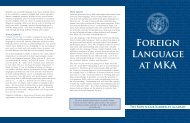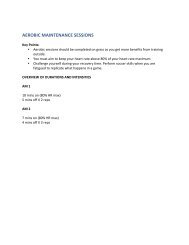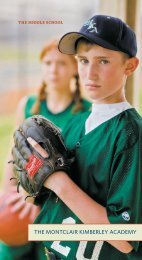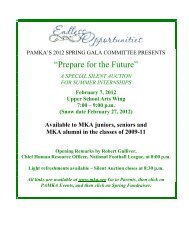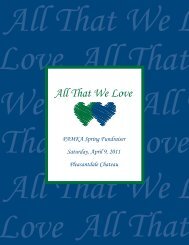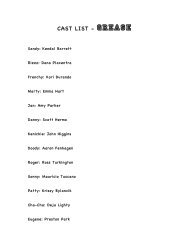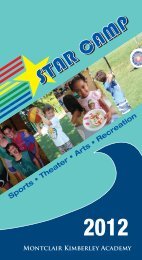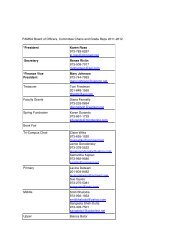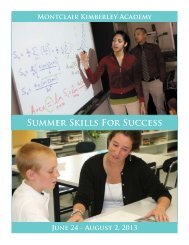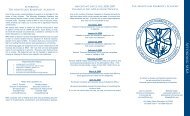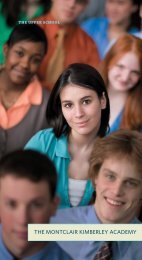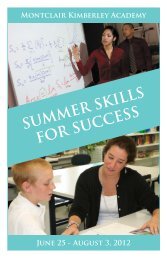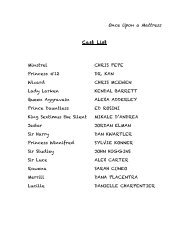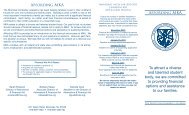Honor Code copy.indd - Montclair Kimberley Academy
Honor Code copy.indd - Montclair Kimberley Academy
Honor Code copy.indd - Montclair Kimberley Academy
You also want an ePaper? Increase the reach of your titles
YUMPU automatically turns print PDFs into web optimized ePapers that Google loves.
CODETheHONOR<strong>Montclair</strong><strong>Kimberley</strong><strong>Academy</strong>
ARTICLE I INTRODUCTIONThis <strong>Honor</strong> Constitution is the culmination of a yearlong evaluation of The<strong>Montclair</strong> <strong>Kimberley</strong> <strong>Academy</strong>’s <strong>Code</strong> of <strong>Honor</strong>. Ideally, this constitution isa living document that will change with the needs of the community.<strong>Honor</strong> is a core value of The <strong>Montclair</strong> <strong>Kimberley</strong> <strong>Academy</strong>. The purposeof this <strong>Honor</strong> <strong>Code</strong> is to instill a sense of honor and an atmosphere of trustamong all members of the community.<strong>Honor</strong> can be difficult to define because it manifests itself in deeds moreoften than it does in words. We all desire a community in which trust,security, happiness, and respect are prevalent for their own sake and arepracticed as second nature. To be an honorable member of MKA is toemploy respect, truthfulness, and civility. While we all come from differentbackgrounds, religions, and systems of morality, it is our responsibility asa community to preserve the ideals that we deem necessary to maintain abeneficial learning environment.ARTICLE II THE HONOR PLEDGEWe at The <strong>Montclair</strong> <strong>Kimberley</strong> <strong>Academy</strong> cultivate an environmentin which respect, honor, learning, and honesty are expected, practiced,and valued. As a student at MKA, I respect the right of the school tomaintain this vision by creating rules that promote a respectful, trusting, andan honorable school environment. I understand that academic dishonesty,personal dishonesty, or cruelty to others is destructive to our community andhinders my personal growth. More specifically, I pledge:• To neither give nor receive help on a test or graded assignment (before,during, and after) unless given permission by my teacher.• To cite any outside sources and receive credit only for my own work.• To respect others as well as their personal property and myself.• Not to be cruel to others.If I, as a member of this community, witness an infraction or haveknowledge of a breach of the <strong>Honor</strong> <strong>Code</strong>, it is my responsibility to notifythe student him/herself and encourage him or her to act accordingly ornotify a faculty member/administrator. If I witness an infraction of the <strong>Code</strong>and do not report it in any way, I realize that I am in violation of the <strong>Code</strong>myself.By upholding these provisions, I will not only maintain the respect ofpeers, teachers, and administrators, but also contribute to the positiveatmosphere of a moral and trusting community.1
ARTICLEVI PROCESSING HONOR VIOLATIONSWhether or not an allegation of an <strong>Honor</strong> <strong>Code</strong> violation comes tothe full <strong>Honor</strong> Council for consideration depends upon the severity of theallegation and/or whether or not the student admits to the violation. TheAcademic Dean, Dean of Students, and Senior Chair will decide whetherthe case will come in front of the full Board. The Head of the Upper Schoolshould be kept involved and informed in the process. In the event that an<strong>Honor</strong> <strong>Code</strong> violation goes to trial, one of the two faculty members willact as secretary. In order for a trial to occur, at least nine members of the<strong>Honor</strong> Council (including Senior Chair) must be present to hear the case.A meeting between the Dean of Students, the Academic Dean, andthe Senior Chair, will determine whether a case goes before the ExecutiveCommittee or the <strong>Honor</strong> Council when a student violates both the <strong>Honor</strong>Pledge and another major code of conduct offense. Generally, the offensedeemed more egregious will determine where the case is heard.Section A – Violations of the <strong>Honor</strong> <strong>Code</strong>If the case does not warrant the meeting of the full <strong>Honor</strong> Council, thenthese procedures will be followed if the student admits to the allegation:1. Academic and Non-Academic Violation: A meeting will be heldwith the person accused of the violation, the person makingthe accusation, the Dean of Students, the Senior Chair, and anadditional <strong>Honor</strong> Council member. The accused and the accuserwill meet with these people separately.2. The full <strong>Honor</strong> Council will be notified of the cases.3. The Head of the Upper School should be involved in each case ina manner that he or she sees as appropriate.When an allegation has been made and the student denies the allegation,or the allegation is deemed to be serious, the student will go before the full<strong>Honor</strong> Council. The <strong>Honor</strong> Council will handle a second violation of the<strong>Honor</strong> <strong>Code</strong> while a student is on <strong>Honor</strong> Probation. Violations of the <strong>Honor</strong><strong>Code</strong> include but are not limited to:PERSONAL DISHONESTY: Personal dishonesty is a <strong>Code</strong> of <strong>Honor</strong> violationand is essential to the preservation of trust in a community. It is considereddishonest for a student to mislead by not telling the whole truth, not statingimportant, relevant information, and not making all reasonable efforts toclear up misunderstandings or unclear areas.ACADEMIC DISHONESTY: Cheating and plagiarism are violations ofthe <strong>Code</strong> of <strong>Honor</strong>. In addition to disciplinary action, students who arefound guilty of cheating or plagiarism may receive a grade of zero for6
parents that the conduct of a student has placed in jeopardy his or hercontinuation as an MKA student. The <strong>Honor</strong> Council for a violation of the<strong>Honor</strong> <strong>Code</strong> may place a student on <strong>Honor</strong> Probation for a specified periodof time.SUSPENSION FROM SCHOOL OR SCHOOL-RELATED ACTIVITIES: Astudent may be suspended from school or school-related activities if aviolation of the <strong>Honor</strong> <strong>Code</strong> occurs which so undermines the trust of thecommunity that a temporary separation from the <strong>Academy</strong> or its sponsoredactivities may be necessary. During the period of separation, a student mustmeet all academic requirements. In some cases, a student may be allowedto attend school, be suspended from participation in co-curricular activities,or be restricted during free time throughout the school day.WITHDRAWAL: In certain cases, MKA may offer to permit a student towithdraw from school rather than to go through a disciplinary processthat may lead to expulsion. Under these circumstances, the withdrawal isunconditional and final.EXPULSION: There are a few offenses that if committed so undermine thetrust and well being of the community, that separation from the <strong>Academy</strong>will most likely occur. Violations of the <strong>Honor</strong> <strong>Code</strong> can lead to expulsionregardless of whether or not one is on Probation. The decision to expel ismade by the Head of Campus, after a hearing by the <strong>Honor</strong> Council or awaiver of that process. An appeal of the final decision may be made to theHeadmaster.Section D - ConfidentialityThe <strong>Honor</strong> Council will protect the privacy of each individual. However,the <strong>Honor</strong> Council reserves the right to publish trial results for educationalpurposes using false names and situations.Three times each year, <strong>Honor</strong> Council will provide a written report to theMKA community addressing issues of concern.Section E – Degrees on <strong>Honor</strong> ViolationsA student will be placed on Open File status if his or her violation wasdeemed to be a minor violation of the <strong>Honor</strong> <strong>Code</strong>. A student will be placedon <strong>Honor</strong> Probation if his or her violation was deemed to be a major violationof the <strong>Honor</strong> <strong>Code</strong>. A student who is involved in an honor violation while onOpen File or <strong>Honor</strong> Probation will likely receive a more serious penalty.Section F – Review ProcessThe status of all students on Open File or <strong>Honor</strong> Probation will bereviewed at the end of each semester. At that time, the <strong>Honor</strong> Councilwill consider the nature of the offense, the length of term, and the student’s8
progress during the time of sanctions. The Council will make one of thefollowing decisions:❑ the student will remain on Open File or <strong>Honor</strong> Probation for the nextsemester❑ the student will be removed from <strong>Honor</strong> Probation but with an Open FileStatus❑ the student will be removed from <strong>Honor</strong> Probation and/or Open FileStatusARTICLE VII REMOVAL OF ANHONOR COUNCIL MEMBERAccording to the self-nomination form for the <strong>Honor</strong> Council, it is expectedthat all members of the Council will behave honorably in all areas of theirlives. If there is serious concern that a Council member is not living up to theexpectations of his or her position, then it is the Head of the Upper School(in consultation with the Dean of Students and Senior Chair) who reservesthe right to remove that person from the Council.In the event that the Senior Chair is not living up to the expectations of hisor her position, then <strong>Honor</strong> Council reserves the right to bring their concernsto the attention of the Dean of Students who will investigate the matter.ARTICLE VIII REVIEW OF THE CONSTITUTIONThe <strong>Honor</strong> Constitution will be reviewed each year. Students and/orfaculty can make proposed changes in writing to <strong>Honor</strong> Council directlyon a specified date before May 1 st . These students and faculty must beprepared to appear before the Council to explain their proposed changes.The <strong>Honor</strong> Council will evaluate each proposed change and put changesforth to the student body. The student body will vote on each proposedchange separately. The Council will make appropriate changes to the<strong>Honor</strong> Constitution and the student body will vote to ratify both the <strong>Honor</strong><strong>Code</strong> and the <strong>Honor</strong> Constitution. A plurality vote will determine renewalof the <strong>Honor</strong> <strong>Code</strong> and <strong>Honor</strong> Constitution, and a signing ceremony for the<strong>Honor</strong> Constitution will take place each September.9
ACKNOWLEDGEMENTSThis <strong>Honor</strong> <strong>Code</strong> is the culmination of two years of hard work. TheCommittee began by writing out its own <strong>Honor</strong> Pledge. Once the pledgewas written and approved by the students and faculty, the Committee wentback to work to craft the <strong>Honor</strong> Constitution. Within the Constitution theCommittee established an <strong>Honor</strong> Council, designed to try all <strong>Honor</strong> <strong>Code</strong>violations. Once the Constitution was finished, the Committee brought it tothe students and faculty where it was voted on and then ratified. Throughoutthe entire process the Committee’s goal was to keep as many people involvedas possible. Through town meetings, Quaker-style morning meetingsand advisor group surveys, students, faculty, and staff were given manyopportunities to discuss the <strong>Code</strong>, ask questions and submit their concernsto the Committee.Many, many people contributed to the project with their ideas, thoughts,questions, and concerns. The Committee charged with leading the projectconsisted of 14 students, 3 teachers and 2 parents. Special thanks to:Denise Sarkor ‘04, Brendan McCaffrey ‘04, Alexis Tucker ‘04,Travis Huling, ‘04 Emily Goodman ‘04, Christopher Tortoriello ’04,Cori Moscowitz ‘05, Nicholas David ‘05, Abigail Cohen ’05, JosephLazauskas ‘06, William Wagner ‘06, Michael Giuliano ’06, EllenDunn ‘07, Parry Sastry ’07, Catherine Walsh (faculty), Carol Spencer(faculty), Sanford Lonsinger (faculty), Linny Andlinger (parent), andLaura Phillips (parent).Throughout the entire process of writing the <strong>Code</strong>, the Committee usedDavid B.L. Gould’s A Handbook for Developing and Sustaining <strong>Honor</strong><strong>Code</strong>s. This handbook acted as a template for the Committee, giving itideas and tips on how to develop an <strong>Honor</strong> <strong>Code</strong> that would work for MKAand its students.While the Committee did the actual writing of the <strong>Code</strong>, none of thiswould have been possible without the flexibility and guidance of the administration.Thank you to Dr. Peter Greer (Headmaster), Charlaine Charlton(Head of Upper School), and David Flocco (Assistant Head/Dean of Students)for allowing the students to truly take control of this <strong>Honor</strong> <strong>Code</strong> andturn it into a document that we can all be proud of.And finally, thank you to every student, faculty member and administratorwho took concern over the <strong>Code</strong> and voiced those concerns to the Committee.Without the support and input of the MKA community, this <strong>Code</strong> couldnever have been written and would certainly not have a place at MKA.Cover Design: Rebecca Beyer ‘05Ratified, May 2004



